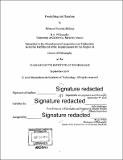Precisifying art pluralism
Author(s)
Millsop, Rebecca Victoria
DownloadFull printable version (6.661Mb)
Other Contributors
Massachusetts Institute of Technology. Department of Linguistics and Philosophy.
Advisor
Sally Haslanger.
Terms of use
Metadata
Show full item recordAbstract
This dissertation explores the legitimacy of art pluralism-the thesis that there are multiple, valid accounts of art. In 2011 Mag Uidhir and Magnus introduced the idea of art pluralism to revive the debate over the definition of art. This discussion has been pushed aside over the past half a century because all proposed accounts prove fallible under scrutiny. The overarching goal of this dissertation is to determine how this new approach-art pluralism-might prove useful in obtaining a satisfactory theory of art. In the first chapter, I introduce art pluralism with the aid of species pluralism the thesis that there are multiple, legitimate species accounts. I go on to criticize the arguments for art pluralism provided by Mag Uidhir and Magnus and go on to provide a stronger, direct argument for art pluralism. In the second chapter, I consider the nature of pluralism in depth by introducing the notion of a complex kind. I claim that all pluralistic kinds are complex kinds and that there are multiple ways a kind can be complex. A kind is complex if and only if more than one account is required to explain its unification and working out the nature of this unification results in the precisification of that complex kind. I go on to precisify species pluralism as an example of this process. In the third and fourth chapters, I demonstrate how each of the relevant art accounts-institutional, historical, and aesthetic-succeed and fail in providing the satisfactory account of art on their own. Instead we must understand these accounts as structurally dependent on one another. I describe the result of this particular structural dependence focal-looping pluralism. In the conclusion, I acknowledge the importance of pluralism throughout the narrative of this dissertation but I am forced to question whether or not the thesis I end up arguing for is really best understood as pluralistic. I argue that art is best understood as a complex, not a pluralistic, kind and that the monist/pluralist dichotomy should be understood as less informative than the simple/complex kind distinction more generally.
Description
Thesis: Ph. D., Massachusetts Institute of Technology, Department of Linguistics and Philosophy, 2016. Cataloged from PDF version of thesis. Includes bibliographical references (pages 105-110).
Date issued
2016Department
Massachusetts Institute of Technology. Department of Linguistics and PhilosophyPublisher
Massachusetts Institute of Technology
Keywords
Linguistics and Philosophy.